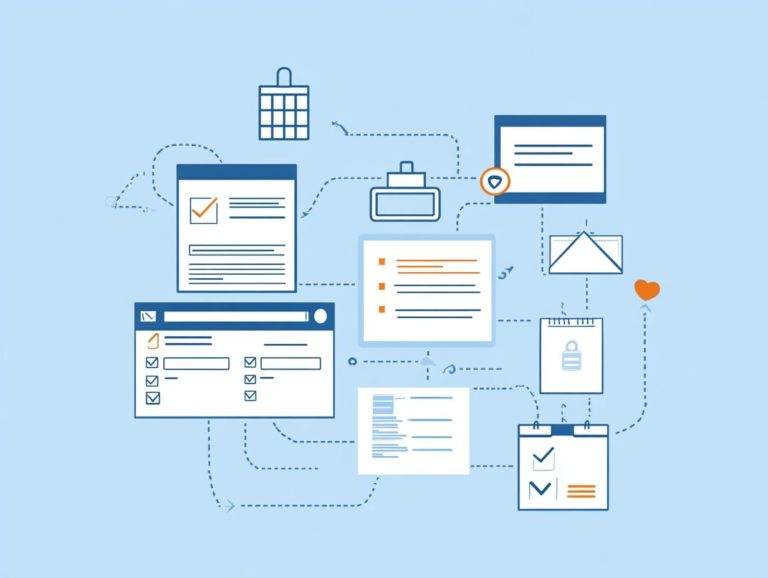How to Leverage Your Online Degree for Financial Aid
Understanding the complex world of financial aid for online degrees can be overwhelming. However, knowing your options can change your experience dramatically.
This article clearly explains the types of financial aid available to you. You’ll learn about completing the Free Application for Federal Student Aid (FAFSA) and finding scholarships and grants designed for online learners.
It covers how to demonstrate financial need, take advantage of part-time jobs offered by schools, and manage student debt through repayment plans and loan forgiveness opportunities.
With these practical strategies, you’ll be ready to make your online education more affordable.
Contents
- Key Takeaways:
- Understanding Financial Aid for Online Degrees
- Maximizing Financial Aid Opportunities
- Using Your Online Degree for Financial Aid
- Strategies for Managing Student Debt
- Frequently Asked Questions
- What is financial aid and how can it help me while pursuing an online degree?
- Are there specific financial aid options for online degree students?
- How can I use my online degree to get financial aid?
- What is the difference between need-based and merit-based financial aid?
- Can I get financial aid for an online degree while working full-time?
- What if my financial situation changes after receiving aid?
Key Takeaways:

Maximize your financial aid by filling out the FAFSA and applying for scholarships and grants.
Show your need for financial aid by using your online degree and exploring part-time job options.
Reduce student debt by looking into repayment plans, loan forgiveness programs, and other financial assistance resources.
Understanding Financial Aid for Online Degrees
Understanding financial aid is essential for prospective students aiming to manage higher education costs. This journey involves exploring funding sources like scholarships, grants, and federal aid options, which are especially beneficial for low-income students who may qualify for Pell Grants.
As online programs grow in popularity, knowing how to apply for financial aid becomes vital. This includes filling out the FAFSA to help finance your education while minimizing debt.
Overview of Financial Aid Options
Financial aid options for online degree students are plentiful. These include federal financial aid, scholarships, loans, grants, and part-time job programs, each with unique eligibility requirements and application steps.
For instance, Pell Grants are available based on financial need, while state grants may focus on residents or specific fields.
Scholarships often target specific groups, like first-generation students or those from underrepresented communities. Explore tailored opportunities that fit your profile.
Student loans provide another funding route. But remember, they require careful planning regarding repayment and interest rates.
Part-time job programs help balance earning income while continuing your education, giving you valuable experience.
To maximize available resources, understand the eligibility and funding sources for each option.
Maximizing Financial Aid Opportunities
Maximizing financial aid opportunities is crucial for online students looking to ease the financial burden of college. By completing the FAFSA and actively seeking scholarships and grants, you can boost your financial aid package significantly. For those pursuing this path, navigating financial aid for online bachelor’s degrees can provide valuable insights.
This approach helps you navigate educational expenses with confidence.
Filling Out the FAFSA

Filling out the Free Application for Federal Student Aid (FAFSA) is an essential first step in securing federal financial aid. It determines your eligibility for various funding sources, including grants and loans.
Understanding the application process and accurately completing the FAFSA can significantly affect the financial support available to you, especially if you’re a low-income student or an online learner.
To get started, gather the necessary documents like tax returns, W-2 forms, and Social Security numbers for both you and your parents. Remember to pay attention to deadlines, which can vary by state and institution. Submitting your application early can work to your advantage.
Be aware of common pitfalls, such as discrepancies in reported financial information or missed deadlines, as these can jeopardize your eligibility for aid.
For personalized assistance, it s highly advisable to consult with the financial aid office. They can walk you through the eligibility requirements and help clarify any uncertainties you might have about the application process.
Applying for Scholarships and Grants
Applying for scholarships and grants is an excellent strategy to minimize your overall cost of attendance, especially if you re a low-income student looking to finance your education.
With a multitude of scholarship opportunities at your fingertips, you can elevate your financial aid game by focusing on funding sources that resonate with your academic and personal profile.
To successfully navigate the competitive landscape of financial aid, start by thoroughly researching scholarships and grants tailored to your specific field of study or unique circumstances. Tap into online databases, university resources, and community organizations to uncover those hidden gems.
Make sure every application shines by tailoring it to the scholarship s values! Crafting compelling personal statements and securing strong letters of recommendation can greatly enhance your application.
Staying organized will help you meet deadlines and further boost your chances of landing that vital funding.
Using Your Online Degree for Financial Aid
Using your online degree can open doors to additional financial aid opportunities, particularly when you demonstrate financial need and meet the eligibility criteria for various funding sources. To maximize these benefits, learn how to utilize financial aid for online learning.
By grasping how your academic performance and program selection influence financial aid, you can navigate the costs of your educational expenses with greater ease and efficiency.
Demonstrating Need and Eligibility
Demonstrating your need and understanding the eligibility requirements is crucial for securing financial aid for online degrees, especially if you’re a low-income student navigating unique financial challenges. It’s vital to recognize the importance of financial aid for online students.
By completing the FAFSA, you can provide essential information that helps institutions assess your financial situation and determine the support that fits your needs.
Along with the FAFSA, you may need to submit supporting documentation, such as tax returns, bank statements, and proof of income to clarify your financial standing further.
Financial aid offices look at things like how many people are in your family and the total cost of attendance when determining your eligibility for various types of aid, including grants, scholarships, and loans.
This comprehensive assessment gives institutions the power to allocate resources effectively, ensuring that those who genuinely require assistance receive the funding necessary to achieve their educational aspirations.
Understanding these criteria significantly enhances your chances of qualifying for aid, ultimately easing financial burdens and promoting greater access to online education.
Exploring Work-Study Programs

Exploring work-study programs can be a game-changer for you as a student pursuing an online degree. These programs provide substantial financial assistance while allowing you to work part-time and offset educational expenses.
These programs offer tuition assistance and valuable employer benefits. They can significantly enhance your professional experience.
You ll find a variety of work-study options tailored to different fields of study. From research assistant roles in academia to internships with local businesses, this diversity enables you to gain practical skills that are directly relevant to your career path.
Eligibility for these programs often depends on financial need. Specific criteria are set by your institution and federal aid regulations. It s advisable to connect with your school s financial aid office to understand how to apply, which typically involves completing the FAFSA form and fulfilling designated low-income criteria.
Seize these opportunities today to cut your education costs and boost your resume! By leveraging these options, you can effectively reduce your educational expenses while simultaneously building a robust resume that sets you apart in the job market.
Strategies for Managing Student Debt
Strategies for managing student debt are crucial for you as an online student. They help you secure a stable financial future after graduation.
By familiarizing yourself with repayment options and adopting effective financial management practices, you can navigate the complexities surrounding student loans and federal government policies.
This proactive approach will help you minimize your long-term financial burden. It paves the way for a more secure economic outlook.
Repayment Plans and Loan Forgiveness Programs
Repayment plans and loan forgiveness programs play a pivotal role in managing your student loans. They provide various options to ease your financial responsibilities post-graduation.
By taking the time to understand the different federal programs available, you can choose a repayment plan that suits your financial situation and long-term aspirations.
Among these options, income-driven repayment plans stand out as especially advantageous. They adjust your monthly payments based on your income and family size, allowing you to manage your finances effectively without sacrificing other essential needs.
The standard repayment plan, on the other hand, involves fixed monthly payments over a ten-year period. This can lead to substantial interest savings over time.
If you re contemplating loan forgiveness, programs like Public Service Loan Forgiveness require you to work in qualifying public service positions for a designated number of years. By familiarizing yourself with these criteria, you can skillfully navigate your repayment journey and potentially lighten your overall loan burden.
Additional Resources for Financial Assistance
Along with federal financial aid, you ll discover a wealth of resources available to help you manage your educational expenses. Community organizations, educational institutions, and employer sponsorship programs often offer invaluable support and scholarship opportunities.
Many local nonprofits and foundations provide specialized scholarships tailored to specific demographics. You can take advantage of these to reduce your tuition costs.
Educational publications and websites regularly compile comprehensive lists of available scholarships, grants, and loans. This ensures you remain informed about the options at your disposal.
Employers frequently offer sponsorship programs that reimburse educational expenses or provide scholarships for employees and their families. By taking the initiative to seek out these resources, you can enhance your financial aid package and create a path toward more manageable educational costs.
Frequently Asked Questions

Have questions about financial aid? You re not alone! Contact your financial aid office now to get started!
Don’t let financial worries hold you back. Explore your options today!
What is financial aid and how can it help me while pursuing an online degree?
Financial aid helps students cover education costs. This includes grants, scholarships, loans, and work-study programs. It reduces the burden of tuition, fees, and other expenses.
Are there specific financial aid options for online degree students?
Yes! There are financial aid options specifically for online degree students. These include federal programs, state aid, and institutional aid. Research and apply for all options to maximize support.
How can I use my online degree to get financial aid?
Start by filling out the Free Application for Federal Student Aid (FAFSA). This determines your eligibility for federal and some state aid. Be sure to search for scholarships or grants for online degree students too!
What is the difference between need-based and merit-based financial aid?
Need-based aid is for students who demonstrate financial need, typically from low-income families. Merit-based aid rewards academic or other achievements, available regardless of financial need.
Can I get financial aid for an online degree while working full-time?
Absolutely! You can apply for financial aid even if you work full-time. Your income might affect the amount you qualify for, but it s still worth exploring all options. Some employers even offer tuition assistance!
What if my financial situation changes after receiving aid?
If your financial situation changes, contact your school’s financial aid office. You may appeal for more aid based on your new circumstances. Communicate any financial changes promptly to explore your options.






